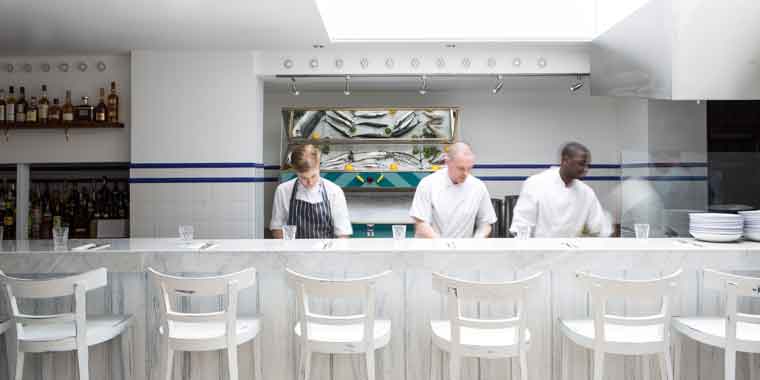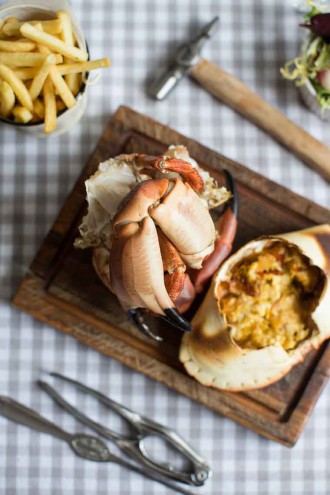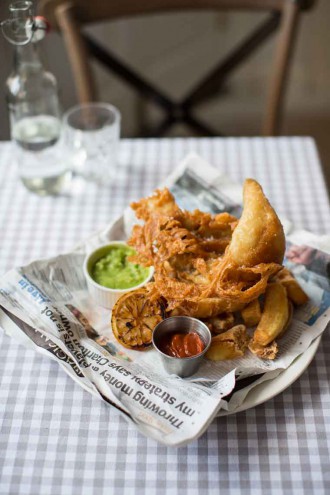Going direct
Bonnie Gull is one of a growing number of fish restaurants that source their star ingredients by going direct to fishermen, rather than via the traditional middleman. Edward Smith visits executive chef Luke Robinson to find out why that can be better all round: for the chef, the fishermen, the diner and the fish themselves.

One of the reasons we like eating out is that we don’t have to do any work: there’s no washing up, no cooking, and no need to think about food shopping, which, for me, is most tiresome part of eating at home.
So we go to restaurants, sit back, and wait for whatever we order to turn up at our table. Bliss.
But how often, as you’re scoffing, do you stop and think: how did this food get here? It’s probably not the first thing on your mind, I’d guess.
But how do restaurants do their shopping? Who do they get their fruit, vegetables, meat and fish from? Produce doesn’t simply turn up at the door, after all
Well, OK, it kind of does. But there’s a complex daily ordering process that goes on to get to that handy delivery stage. A chef’s “shopping list” is multi-faceted and often based on a finely balanced guestimate as to how many mouths they will need to feed over the next 24 hours. After service finishes in the evening, they’ll scribble their next day’s needs down and get on the phone to their network of suppliers.
Fish can be pricy and it needs to be very fresh, so many restaurants order little and often. Typically they’ll go to a single supplier who buys in bulk and can provide the range of seafood they need at a good price. That supplier might be a trusted fishmonger or broker with links to boats, or who shops daily at Billingsgate or another major market, often to order based on requests from the restaurant and other trade customers they deliver to.
Or rather, that’s the way it used to work. Increasingly, though, restaurants are going direct to source themselves. Because while there’s nothing wrong with the traditional monger/broker route, buying from boats and/or fishing cooperatives can benefit both the people who catch and cook the fish – and even the fish themselves.
Bonnie Gull is a case in a point. It’s a small seafood restaurant group, currently with two sites in central London. The quantity of wet fish and seafood that they go through on a daily basis allows them to source direct from around the British coastline. The result is accessible, affordable fish, and a changing menu that showcases the daily catch.
I went to Bonnie Gull’s newest restaurant in London’s Exmouth Market to meet their executive chef, Luke Robinson – a 2006 graduate of Jamie Oliver’s Fifteen Apprentice Programme – to find a bit more about their approach to buying fish.
How does Bonnie Gull get fish for its Fitzrovia and Exmouth Market sites?
Our approach is different to the majority of restaurants. Rather than using a broker and asking for what we need for our pre-agreed menu – always just asking for x kilos of salmon, x kilos of turbot, x kilos of cod or whatever – we look at what’s sustainable, what’s in season and where particular types of fish come from. Then we get in touch with specific people in the right areas and see what they’ve caught that they can deliver to us on the same afternoon or evening. We shop from the bottom up, rather than top-down. We’ve built up a little network of suppliers from around the British coastline to help us do this.
So how does that work from a menu perspective – is it a bit of a lottery as to what you will be cooking each day

Rather than get fishermen to chase fish, we find out what’s available and good, and then we tweak the menu to fit that. We do new dishes all the time, but we don’t reinvent the wheel every day: we make it work by planning garnishes around a group of fish that go well with the same thing. So if we have a dish that’s ideal for lemon sole, but that’s spawning, we’d go for plaice and serve it the same way. It’s common sense, really: right now, for example, broad beans or St George mushrooms are adaptable to a number of different fish.
OK, I understand the principle, but how does that work on a daily basis? How do you know what’s been caught and how many people do you get deliveries from?
Well, first of all, we’re not in the dark each day. Because we have a relationship with the fishermen, boat cooperatives and guys on the coast that we liaise with, we know in advance roughly what’s in good stock and what isn’t, or what’s spawning and should be left alone. Then each morning, at about 7am or 7:30am, I start getting texts telling me what’s been landed. And I make calls to people who don’t do the whole text thing! And by 9:30am or 10am, I start ordering for both sites. It’ll be with us that afternoon or evening.
Sounds easy enough…
It’s quite a lot of work when you think the alternative is just to call one guy and ask for what you want! It can sometimes be a bit overwhelming.
[Luke gets a text at this point, telling him there’ll be no squid delivery that evening.]
There you go: things don’t always come in. We have a number of different options, but it’s too late for today now. So squid will be off tonight. It’s fine.
What options do you have? Do you get one thing only from certain contacts, or can you mix it up?
We have go-to people for certain things: the guys in the Isle of Man for our scallops and half-shell queenies; a man in the southwest for our crab; and my oyster, cockles and clams guy, Dom, in Sussex, for example.
But for a lot of the wet fish, the weather and the seasons make different parts of Britain’s coastline good for different fish at different times. We try to go for the closest coasts to London – Cornwall, Devon, Portsmouth, Sussex, Suffolk – but if the weather’s bad in one place, we’ll need to look elsewhere.
Is it hard to stay on top of what’s in season or what’s sustainable?
We try to monitor sustainability, but it’s hard for chefs to really know. I keep an eye on a “watch list” and the MSC certification (though that’s not without its problems), but ultimately we’ve had to build relationships with fishermen, find people we feel we can trust, and also build knowledge ourselves. There’ll be things I learn this year that I’ll be able to broadly apply at the same time next year.
Speaking with people on the coast means I pick up things. Supply and seasons change from year to year. So if something is supposed to be available but there’s not much around, we’re happy to wait until it really is in season and abundant rather than chasing scant supply.
Why shop for fish in this way?
Because we get incredible fish! One guy gets us line-caught pollack that’s so fresh it’s blue. I reckon it’s a lot better than a ropey bit of bass; the quality is amazing. The sooner you can get it from when it came out of the water, the more amazing the product – and the less work it needs.

We know where every fish comes from. I think that direct contact helps responsible fishing, and means we learn more – which ultimately means a better product. We get fresh fish every day of the week too: there’s fishing every day of the week, it’s the markets that close. And because we cut out the middleman, the fishermen get a bit more money.
Ultimately, we think it’s the right way to do things and it suits us. We’re a fish restaurant and we want to source our star ingredients responsibly. We’re not unique, but because we only sell fish, we can work like this for all the protein we buy. It might not work for everyone – some people will need to use brokers to ensure they can fulfill their menus. But places like Caprice, Bentleys, J Sheekey I guess will do it in a similar way to us because they are big operations.
I reckon it makes complete sense, Luke. Finally, for people cooking at home who don’t have that direct link, what’s good at the moment?
Well they should definitely speak with their fishmonger – they’ll know. But right now, black bream is awesome. It’s just finished spawning and is fantastic. Lemon sole is out of spawning, but they’re still a bit thin so we’re leaving those. The Channel squid is just starting to come in now. And all the oily fish – mackerel, sardine – are banging.
www.bonniegull.com
Pictures by Helen Cathcart.
Edward Smith is a London-based cook and food writer. He left a perfectly good career as a City lawyer two years ago, retrained as a chef at Westminster Kingsway and since then has run pop-up restaurant events, worked in professional kitchens, on BBC2 cookery shows and as a private caterer. He writes for various publications and has a food blog called Rocket and Squash. Ed was shortlisted in the Best Online Food Writer and Best Online Restaurant Writer categories of the 2013 and 2014 Fortnum and Mason Food Awards





